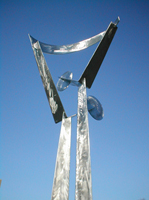
Bryn Mawr College

 |
Center Bryn Mawr College | 
|
October 9
Katherine Rowe
"Science, Culture and Time"
The discussion began where the last one left off, with the observations that scientists had traditionally studied non-human artifacts, while humanists focused on human experience, and that the former are now showing a greater interest in the latter. Science's increasing acknowlegement of its need for the resources of "poetic thought" is evidence of historical progress. But Serres performs only a "scientific reading" of Lucretius; he dismisses a humanistic reading, and the methodological distinctions which it might bring into the conversation. Why is it important that Lucretius described turbulence and chaos in terms that anticipated the work of contemporary scientists? Does acknowledging that fact have a pathos/a pathetical quality? Is Lucretius only relevant from the perspective of current scientific work? Is there then no sense of an advance? Does he function as a founding narrative, offering a grounded claim for the necessity of science? Was the "idea of turbulence already in the air"? (Groans and laughter here). Lucretius eloquently put science into society, made it accessible; referencing him can broaden our students' concpetions of what we do. The richness of complex texts transcends time.
Most useful is Serres' account of reading texts as occupying several historical periods @ once. His notion of "layered temporalities" set in a complicated moment of apprehension (akin to that of Proust and Bergson) challenges the idea of the uniqueness of any particular era. But we have to do historicist work. Serres reverses the classical notion of time as a flat sheet, with ideas as cyclic, but the two modes are equivalent: thinking of time as warped in relation to the measure of ideas doesn't "get us anything more" than thinking of ideas being "crumpled" in relationship to linear, progressive time. Time is the way we measure our distance from Lucretius. "Pleating back" might be another way of describing the phenomenon of "consorting w/ dead bodies."
It was suggested that a number of different definitions of time were in circulation concurrently, that we were mixing up (for instance) psychological time (which depends on memory) with the theromodynamic conception of time. In confusing phenomenological with typological time, we were privileging our experience of time, conflating time and memory. Is there a distinction to be made between the two? An emotional event, like the death of one's mother, is more "proximate," continues to send off "concentric echoes" of energy. Serres' treament of Lucretius doesn't go far enough to deal with the matter of lost memory. If you believe in linear time, you choose certain memories; the time you construct is based on the I who is present. But there are other presents, and so other pasts.
Or perhaps we were confusing time and the measurement of time. Simultaneity is not absolute, but relative. There is a socially accepted measure of time: the clock. Time is a lens for judging epistemological value: how areas of intellectual work decide what is valuable as knowledge. Serres uses science as the "strong man" in his essay, but his is really a text about historiography. What is @ stake in it is not phenomenology vs. mechanical time, but how knowledge recuperates itself. Science uses time as a convenience, as a historical explanation. It presumes that time is a location parameter, operates with the metaphor of time as space, "with an address," assumes that all of time can be laid out, and particular times specified on that manifold. But all you have is the present, creating the future by drawing on what has been previous; time is not a place, but the reality of change.
According to the second law of thermodynamics, to create something new, you have to give up the old. There is a fundamental relationship between creating new and abandoning old stories. Entropy results from the creation of order; the order of the universe is always going down. And what we miss is the noise, the turbulence. Everything has a price. Each gain in scientific knowledge comes @ a cultural loss; the relation is contestatory. (Although we began our discussion w/ an acknowledgement that science and culture needed one another, we seemed to have ended by setting them in opposition!) In the history of science, what qualifies as an advance? How big does it have to be? Can it be measured by how much history it alters? By how it affects the future? The only advantage of conceptualizing time as crumpled and/or ironed out is that it changes our sense of progress. Statistically, the future has more possibilities (that is, less order) than does the past. We keep interrupting entropy, by sweeping up the muck. Perhaps we should let it be. (Several of us ended the conversation with a pact to cease housecleaning. Stay tuned.)
We acknowleged that Bruno Latour (the humanist in the essay, who had been skewered in the Sokol affair) had been omitted entirely from our conversation. Colleagues were also advised to read Borderliners by Peter Høeg for a philosophical meditation on the nature of time.
Our sessions will resume on October 23, when Tomomi Kinukawa will
lead us in a discussion of "The Scientist's Body." She will
start our conversation with two interrelated questions: What are the
cultural meanings of the alleged disembodiment of scientists? How
does the scientist's "disembodied body" participate in producing
scientific knowledge? Anthropologist Sharon Traweek's article
"Bodies of Evidence: Law and Order, Sexy Machines, and the Erotics of
Fieldwork among Physicists" will be available on E-Reserve.
Home
| Calendar | About
| Getting Involved
| Groups | Initiatives | Bryn Mawr Home | Serendip Home
Director: Liz McCormack -
emccorma@brynmawr.edu
| Faculty Steering Committee
| Secretary: Lisa Kolonay
© 1994-
, by Center for Science in Society, Bryn Mawr College and Serendip
Last Modified:
Wednesday, 02-May-2018 11:57:05 CDT